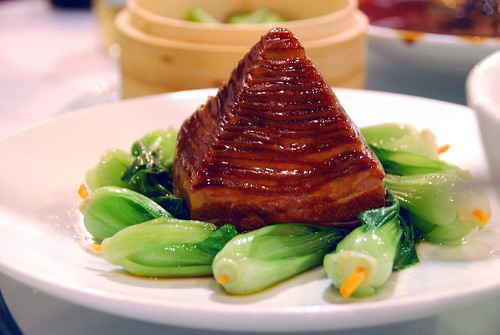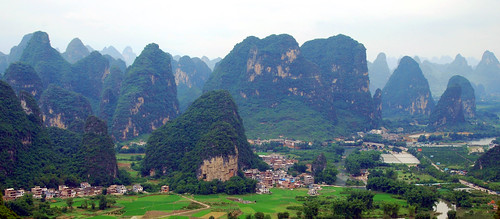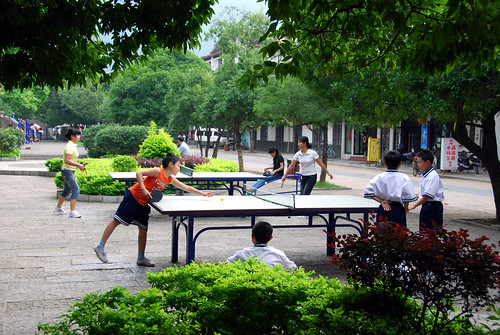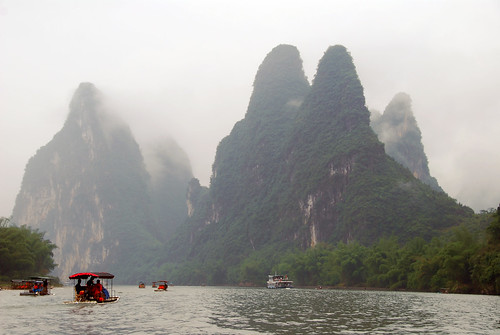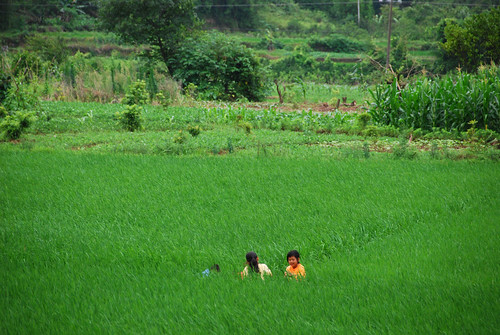Posts Tagged ‘Yangshuo’
Oh, the highs and lows of traveling through China! There were definitely some lows (see Qingdao: Confronting Identity in a German Town in China and Yangshuo: Anatomy of a Scam), but the peaks and the valleys seem to flow into one another so that you’re no longer sure what hurts so bad and what hurts so good. Our Yangzi Three Gorges River Cruise is the perfect metaphor: we spent three days on a 4th class river boat with a bunch of half-naked Chinese people who only stopped smoking cigarettes, spitting, and playing mahjong long enough to follow a megaphone-wielding tour guide around in 100 degree heat. Yes, it was unpleasant at the time. But even now, almost 3 months after the fact, we bring it up in conversation almost every week and giggle at the absurdity of it all. It’s sort of like running a marathon: when you’re in the moment, you can feel blinded by the pain, but once it’s over, you’re really glad you did it.
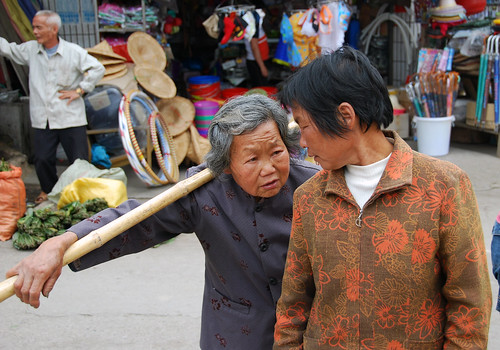
Ladies at the market near Hakka House.
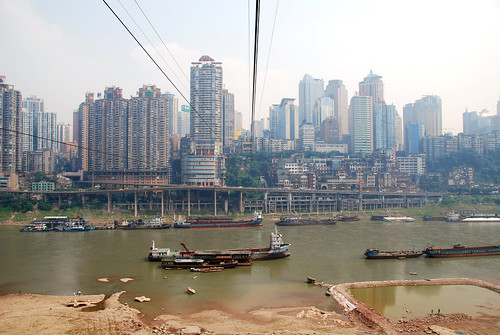
View of Jiefangbei from across the Jialing River in Chongqing.
As Jeremy put it, “of all the countries we’ve been so far, China is the one I would have most regretted missing.” China is relevant, y’all. It is freaking fascinating there right now, a place where nothing stays the same for more than a few weeks, the government is still messing with people’s civil liberties in exchange for making them rich, and people are spitting on the street in their US$500 Gucci heels. We think every Westerner should go. Observe. Learn. And see what a country of 1.3 billion people all working together to pull their country up by its bootstraps looks like. There’s no place like it.
Days spent here: 43 (26 days in Southern and Central China, 17 days in the North)
Highlights: Huangshan, Yangshuo (for Jeremy), Yangzi River Three Gorges Cruise (somewhat painful, but also unforgettable), Beijing
Places we would like to visit next time: Western China (i.e., Tibet, Xinjiang, Jiuzaigou) and Mongolia
Average daily expenditures (for two people): US$213 for 13 days on our 5 star hotel/fancy eating tour with my parents (heavily supplemented by Jack and Wendy—thanks Mom and Dad!), US$120 for the remaining 30 days on our usual 1 star hotel/street food backpackers tour
Prices: China’s pretty reasonable. Food is very inexpensive (from US$5-10 per person per meal) and accommodation can be pretty cheap too. On average, we paid about 200 RMB (approx. US$30) per night for a double room ensuite. We used hostelbookers.com and Ctrip.com to book our accommodation, and we got great deals using both websites.
Weather: Do yourself a favor and don’t visit northern China in June or July, unless you like your searing heat with a dash of crushing humidity. Don’t say we didn’t warn you.
Language: There are 300 million people in China learning English right now—that’s the same number of people that live in the US! But you wouldn’t know it from traveling in this country. If you don’t speak Mandarin, polish your pantomiming skills before you go. On the other hand, if you are a wai guo ren with Mandarin speaking skills, prepare to be worshipped. The people will fall all over themselves with delight.
If you do speak Chinese, be warned that you will need to overcome not only regional accents, but regional phrases as well (ex. if you are from Taiwan, you will call a spoon a tiao gen, but a Beijinger will refer to it as a shao zi). For instance, I had the following conversation with a person in Taishan (in Chinese, of course):
Hope: Excuse me, do you know if there is a pharmacy around here?
Random Person: A what?!? A pharmacy?
H: Yes, a pharmacy.
RP: I don’t know. Why don’t you go ask over there [points to a pharmacy], at the medicine store?
Oh yeah, and if you’ve ever been interested in visiting China, go now, before all the Chinglish gets wiped out.
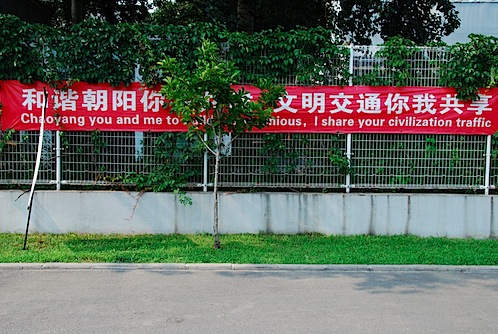
One day, China will be void of gems like this (reads: Chaoyang you and me to build harmonious, I share your civilization traffic)
Food: Outside of our eating tour with my parents and the food in Beijing, we weren’t too impressed with Chinese cuisine. We said it before and we’ll say it again: if you want the best Chinese food in the world, go to Taiwan.
That being said, China is a great place if your culinary hero is Anthony Bourdain. We got over ourselves really fast in Chongqing, where my aunt’s friends took us out to meals involving pig brains, duck tongues, cow rumen, and various other intestinal elements. You can also try snake, turtle, or live scorpions. Yum?
Transit: China’s got a pretty good rail system for such a big country. Chinese trains are not quite as nice as the trains in Taiwan or Japan, but they’re not as bad as the trains in Vietnam, either. For long journeys, you can purchase tickets for a soft sleeper (most expensive), hard sleeper, soft seat, or hard seat (cheapest). Soft sleeper trains are pretty nice, with 4 beds in each room, AC, clean sheets, and relatively clean bathrooms. “Hard sleeper” sounds scary, but it’s worth noting that hard sleeper beds aren’t hard—the mattress is just a little bit thinner. The biggest difference is that there are 6 beds in the hard sleeper rooms rather than 4. Since J and I are tall, we usually traveled in the soft sleeper trains, which are still relatively cheap, even though tickets are 1.5-2 times as much as the hard sleeper carriages.
For information on routes, schedules, and prices, check out ChinaTravelGuide.com’s fabulous online train schedule database.
The bigger cities like Shanghai and Beijing have subways, but Shanghai’s subway system has pretty bad signage and confusing connections. Beijing’s subway did not reach most of the sites in the city center, so we did a LOT of walking or took taxis. Luckily, taxis are very cheap in China’s capital city, but you’re going to have to speak Mandarin in order to get where you want to go.
Internet: Web access is great all over China—as long as the government isn’t blocking the site you want to surf. YouTube, Flickr, Facebook, Twitter, and all blogspot sites got blocked for periods of 3-10 days while we were in China due to the 20th anniversary of Tiananmen Square and the deadly Uighur protests in Xinjiang. Annoying.
Culture: Get ready for a culture shock. Get ready for people constantly cutting in front of you in line. Get ready for men walking around in inappropriate places with their shirts hiked up above their nipples. Get ready for spitting. Get ready for half-naked babies pooping in the street. Get ready for smoking. Get ready for LOUD. That being said, once you figure out how things work, it’s easy enough to deal with them.

Baby at the Summer Palace wearing the poop pants.
One fascinating thing about traveling through Taiwan and China is that we got a firsthand look at how differently these two countries developed culturally. The Taiwanese are exceedingly polite, aggressively helpful, and overly concerned about safety. The Chinese on the other hand, are rude and pushy, frequently uninterested in helping you, and some of the craziest drivers in the world. Now, you could point to many reasons for this cultural gap: the fact that it was the intellectuals and people of the upper classes that moved to Taiwan in 1949 to escape Communist persecution, the effect of 60 years of Communist rule on the people of China, etc. But I’d like to propose a different hypothesis: It’s the sheer numbers. There are 57 times as many people in China as Taiwan. You would get CRUSHED in China if you were nice and helpful to people all the time. The result is, if someone vouches for you in China (as my aunt did, in our case), you get extreme, excessive kindness from people that you may only marginally know you. But those same people on the street may wave you off if you ask for help. Yes, it’s a contradiction. But it’s a fact of life here. All I can say is, try to make friends with a local. If you do, you will get the red carpet rolled out for you.
In short: It’s not always pleasant, but that doesn’t mean it’s not a great time.
J and I are on our own again, and here’s where the story really gets interesting. Not that China wasn’t interesting before…it’s just that we’re now no longer on the 5-star hotel circuit. ‘Nuff said, right?
Our next destination was Yangshuo, a town near the city of Guilin in Guangxi province, famous for its karst topography. By the way, if you didn’t know, “karst” means “limestone formations.” Jeremy hates this word…he thinks it sounds ugly and abrupt, which is contrary to the word’s meaning. In fact, the karsts are quite beautiful…huge mounds of rock jutting out from the land, like some giant underneath the earth was playing Whack-A-Mole. Yangshuo is very similar to Halong Bay in Vietnam, except that Yangshuo is on land, whereas Halong Bay was in the water.
Thus far, we’ve only seen this country as part of a tour group, which, quite frankly, is a good way to ease into the chaos that is the People’s Republic of China, especially when you are coming from an orderly, polite, and developed society like Taiwan. We’ve been insulated from much of the logistics of traveling, like figuring out how to get from point A to point B, negotiating with locals trying to sell you tours or various means of transport, or trying to figure out what is OK to eat when you can only read about 35% of the menu. We’ve also had very little contact with Westerners (besides the ones on the tour), since most of the places that we went with my parents were sites on the local—not international—tourist route.
So imagine our surprise when we arrived in Yangshuo and saw wai guo ren’s all over the place! We were gawking at them like the locals gawk at Jeremy…in retrospect it would have been really funny to ask them to take a picture with us (funny to us, they probably wouldn’t find it too amusing).
Yangshuo is very much a tourist town on the Western backpacking circuit, but it is very pleasant nonetheless. You can see school kids playing ping-pong at tables set up along the Li River (which borders the busiest part of town).
Our hotel room had a view of a manmade pond where a local fisherman “fished” (I am pretty sure this was just a performance for the tourists) with his cormorants (large pelican-like birds that try to swallow the fish; a ring around their neck prevents them from doing so…allowing the fisherman to extract the fish from the cormorants’ mouths).

Local fisherman walking through town with his cormorant.
At night, the main street through town (West Street) becomes a night market, full of the usual trinkets (cell phone charms, fans, fake jade bracelets, backscratchers, etc.) aimed at the tourists. One weird thing we saw for sale were these airbrushed caricature t-shirts of Osama bin Laden next to Yao Ming and Obama…apparently some people in China do not consider Osama in Laden to be “bad,” they see him as a rebel, with the accompanying idolization.
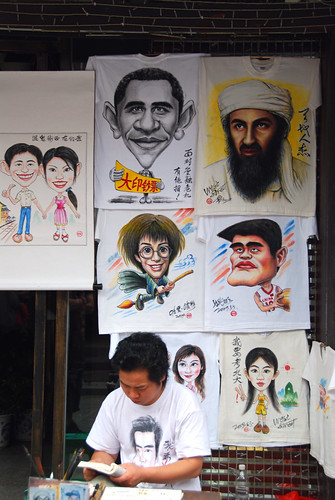
Buy your t-shirt of Obama, Harry Potter, Yao Ming, or…Osama bin Laden?
But most people do not come to Yangshuo to shop in town; it’s the karsts that are the star of the show. So we headed for Xing Ping, a smaller town a little ways up the Li River, where you can take a bamboo raft down through all those beautiful limestone molehills.
Perhaps our first indication that the day was not on our side was the weather: it was misty and drizzly that day, making our boat ride cold and wet, not to mention unscenic (the fog was too heavy that day for us to see much, though it did add a touch of drama to the events to come).
As soon as we stepped off the bus in Xing Ping, we were accosted by many touts (all women) trying to sell us a bamboo raft ride. As the walk to the pier was quite long, I struck up a conversation with one and we agreed on a price: 100 RMB (about US$15) for the ride. I tried to get her down to 90 RMB, but she then came up with a mythical “park entry fee” of 10 RMB each. If we agreed to pay 100 RMB, she would pay the park entry fee; if we wanted to pay 90 RMB for the ride, the entry fee was our responsibility. Our negotiation was quite genial, and we were laughing and joking as we walked. We settled on 100 RMB, and she and the other two ladies who were walking with us stopped to throw three wads of paper on the ground; whoever picked up the correct piece of paper would get the sale.
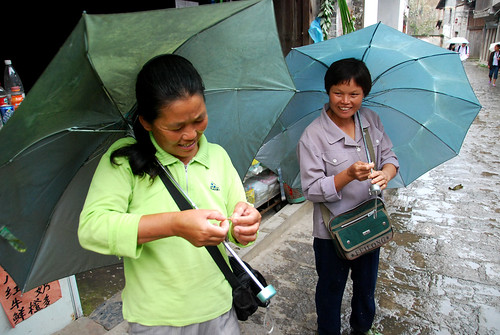
Two of the tout ladies in Xing Ping checking their wad of paper to see who won the sale.
Though we had negotiated with the woman on the left, the woman on the right won the sale, and she showed us to the pier, where her husband was waiting with his bamboo raft. When we arrived at the pier, another Chinese couple, who had been on the bus to Xing Ping with us, approached us about sharing their boat for only 60 RMB per couple. Our bamboo raft lady was furious, and we felt that we had given her our word, so we told the couple that we couldn’t join them on their boat.
We got on the boat and paid our 100 RMB. Two minutes after we had sailed off, the lady calls her husband and tells him that we forgot to give our extra 20 RMB “park fee.” I couldn’t believe it…we were being scammed! And by my own peoples! Now it was MY turn to be furious…not only was she increasing the price on us, but had we turned down a better deal with the bus couple to stay faithful to her! Needless to say, the ride down the river was not pleasant or interesting…the old bamboo raft man pointed out not a single point of interest (he even neglected to mention when we arrived at the “20 RMB spot”—on the back of the 20 RMB note, there is an image of Yangshuo…and yes, the irony of the fact that we were disputing over 20 RMB was not lost on us).
After a cold, wet, and uneventful raft ride, we got back to the pier, where we planned to leave without paying the 20 RMB…after I took down the man’s name (he wrote a fake name, I am sure). He followed us along the road, yelling and screaming about his 20 RMB. Finally, having had enough of this drama, I took out 20 RMB, threw it on the ground, and yelled at him in Chinese “YOU THROW AWAY YOUR FACE!” (the equivalent of “You should be ashamed of yourself!”), causing a huge scene in front of a bunch of other tourists.
I realize that 20 RMB is not a big deal, but it was the principle of the matter! Later on, we asked a couple of locals to identify the woman in the photo above so that we could report her to the local tourist office, but nobody would tell us her name. By now, my opinion of Xing Ping had been sealed…I did not like this place.
Luckily, our ugly day in Xing Ping was followed by a much nicer day biking around Yangshuo. A couple of scenes from our ride:
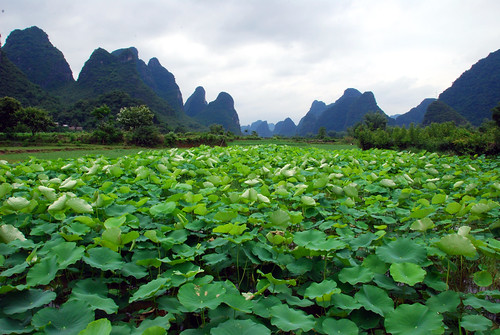
Lily pond in front of Yangshuo’s karst scenery.
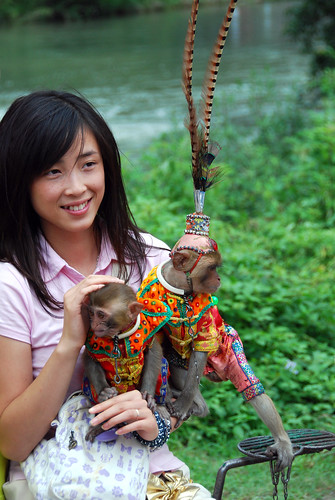
Totally random—at a park built around a 1000-year old Banyan tree, tourists can take photos with monkeys in costumes. We felt terrible for them, as they were clearly confused and terrified.

Us, at the top of Moon Hill, so named for the perfect circle (like a full moon) in the center of the rock.
We had a nice day in Yangshuo—one might even say it was a beautiful day, but I still had the bad taste of the previous day’s scam in the back of my mouth. A couple of life lessons we learned from this experience: (1) where there are Westerners in China, there are scams, and (2) just because something is beautiful on the outside, doesn’t mean it is the same on the inside. In the big scheme of things, 20 RMB was a very small price to pay to learn these lessons. But for me, Yangshuo had thrown away it’s face, and though there was much more to see in the greater Guilin area, we scurried out of there as fast as we could, eager to get the bad taste of Yangshuo out of our mouths.

